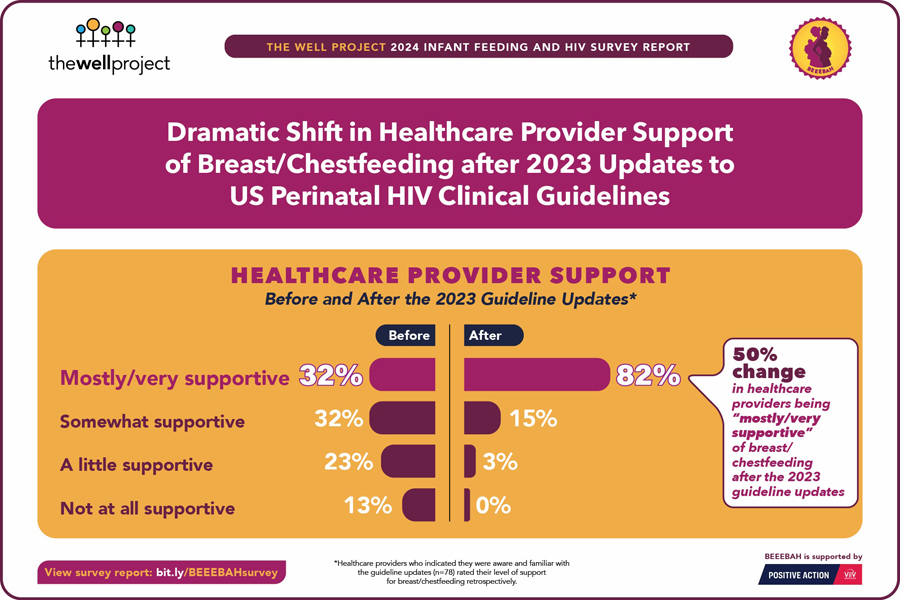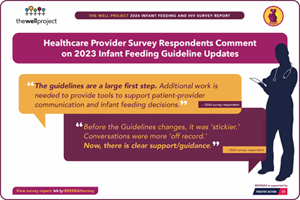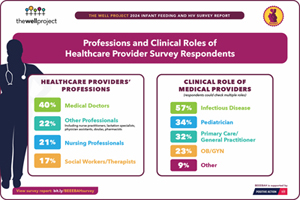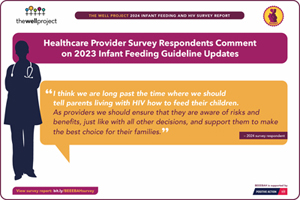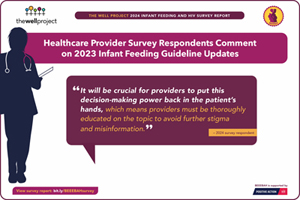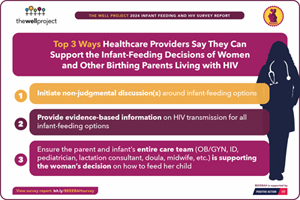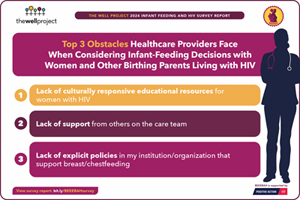Click the image above to save as a jpeg or share online
Groundbreaking infant-feeding updates in the US Perinatal HIV Clinical Guidelines have led healthcare providers to report significantly increased support for women and other birthing parents living with HIV who are interested in breast/chestfeeding. In a survey conducted by The Well Project, 82 percent of healthcare providers indicated they were "mostly/very supportive" of breast/chestfeeding for parents living with HIV after the 2023 guideline updates, compared to just 32 percent retrospectively indicating such support prior to the updates.
Since 2018, The Well Project has been actively driving advocacy efforts, conducting needs assessments, and producing accessible, evidence-based resources to support parents living with HIV in their infant-feeding decision-making. In late 2021, The Well Project launched BEEEBAH (Building Equity, Ethics, and Education on Breastfeeding and HIV) – a comprehensive, multi-tiered project that encompasses the organization's work in this area.
Click an image above to save as a jpeg or share online
In January 2023, the US Department of Health and Human Services (HHS) issued broad updates to the "Infant Feeding for Individuals with HIV in the United States" section of their Perinatal HIV Clinical Guidelines. The updates clarify HIV transmission rates through breast milk (less than 1 percent if the lactating parent has an undetectable viral load and is taking HIV medications); discuss important social, emotional, nutritional, disease-prevention, and other benefits of breastfeeding to parents and babies; and assert the need for shared decision-making and increased support from providers around parents' infant-feeding choices. The American Academy of Pediatrics followed with similar updates in May 2024. These modifications represent a notable accomplishment for advocates, including The Well Project, who worked on various levels for several years to effect these changes.
Through BEEEBAH programming, The Well Project conducted the 2024 Infant Feeding and HIV Survey to help measure stakeholder knowledge and attitudes, as well as the impact of the HHS guidelines update. The survey is a follow-up to a baseline knowledge survey disseminated in fall 2022 (prior to guideline updates).
The Well Project developed both surveys in partnership with ETR, a non-profit organization providing science-based training, evaluation, and other services to improve health equity. The 2024 survey was administered online via the SurveyMonkey platform in February and March 2024 and closed with 226 complete responses. While the survey was shared to broad networks, its main audience was healthcare providers (n = 117, or 52 percent of respondents) serving people living with HIV. Respondents also identified their roles as working in an organization that supports people living with HIV (39 percent), public health professional (27 percent), and person living with HIV (22 percent).
Click an image above to save as a jpeg or share online
The survey results reflect strides made in publicizing the updated guidelines, which are proving to be powerful tools to support shared, informed decision-making. Community-focused innovations in the guidelines, such as discouraging harmful calls to family-surveillance agencies in response to infant-feeding inquiries, may also increase engagement in care and strengthen patient-provider communications.
"Breastfeeding in South Florida is NEW! I'm actually one of the first persons living with HIV to do it. May I add, all of this was possible because of the research and data The Well Project has presented. Thank you for that! My doctor made sure everyone in that hospital knew that I was going to breastfeed, and I have the support of EVERYONE.” – from "My Breastfeeding Journey!" by A Girl Like Me blogger AhmazinAshley, whose second child was born after the 2023 guidelines update
Survey respondents also shared the top three ways they believe they can support the shared decision-making model outlined in the guidelines, as well as the top three obstacles they face, including lack of both coordination across care teams and explicit policies around infant feeding within their institutions.
Click an image above to save as a jpeg or share online
Overall, the updates to the guidelines are shifting attitudes and behaviors among healthcare providers, encouraging them to listen to the needs and desires of parents living with HIV and support them with evidence-based practices. These changes facilitate patient-provider relationships that honor the whole person and ultimately improve the health and well-being of parents living with HIV and their children.
Still, efforts to increase awareness of this vital information must continue. The Well Project stands with a vigorous and growing movement to expand infant-feeding knowledge among HIV care and service providers, women and other people living with HIV, and key stakeholders and allies – including non-HIV specialists – to support parents in knowing their options and making optimal decisions for themselves and their families.

More on:
Infant Feeding and HIV
Reproductive Options


